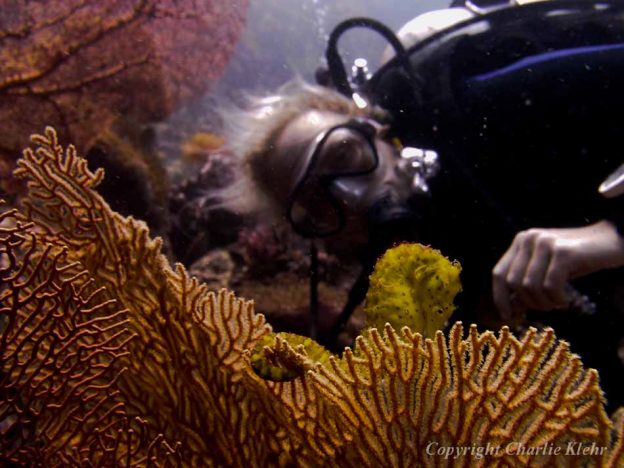7 am: Arriving at work, I start by looking at the board. 8 fun-divers today and an awesome day planned – Umbrella and Tongo is on the schedule! Umbrella is also known as the airplane wreck and is one of my favorite dive sites in Moalboal and although I’ve dived the site numerous times before, the thought of going there always excites me. I start preparing for the day; there is almost 2 hours until the boat leaves and there are still lots of things to be done: set up guests equipment, prepare the boat, count extra-tanks….

Busy day ahead!
9 am: All guests have arrived to the dive-center. Today I’m guiding a lovely couple from Israel who are here on holidays. The best part of my job (except for the obvious – getting to dive in paradise every day) is that I get to meet people from all around the world; hearing their stories and getting to know their cultures. All dive guides and instructors here at Quo Vadis are happy guiding divers of all qualification levels, everything from beginners to professional divers. It turns out that my divers today are very experienced and for that reason, I let them plan their dive entirely, which they seem to be very happy about. All in all we had two wonderful dives with lots of laughter in between.

Exploring Moalboals only wreck at dive site Umbrella
1 pm: As the boat returns back to the dive center I help the divers to rinse their gear and inform them about this afternoons dive. An hour and a half to go before the boat departs so I take a seat in LaPayag seaview bar and restaurant to grab some lunch. As a person of habit, I get the Arista Burger and enjoy a quiet lunch in the shade.
2.30 pm: As I come back from lunch I’m pleased to see that my student for this afternoon’s Discover Scuba diving session has arrived. For those of you who don’t know, the Discover Scuba program is a quick and easy introduction to the underwater world for non-certified divers. My student for the day is a young fella from Canada who tells me he has wanted to dive for quite some time but never got around to it. He also tells me he is somewhat nervous about this afternoon. I tell him that this is a very common feeling as it is a whole new experience to breathe underwater, but that most people can overcome this and quickly learn to relax once in the ocean. In addition, Moalboal is one of the best places to start diving as we have many shallow dive sites that are perfect for new divers.
We take a seat in the outside seating area of the dive center and go through some basic dive theory before we head out to the pool for some skills and in-water practice. Half an hour later we are done and I see a much more confident student in front of me, which makes me even more thrilled for our dive in the ocean. Long story short, an hour later we exit the water from our beautiful house reef, having seen 14 turtles (!!!), a giant frogfish, a nudibranch and a never ending number of beautiful corals. Not bad for a first dive huh?!

Coolest dudes on the reef! We saw not only one but 14 of them!

1 out of the 14 (!!!) turtles seen on one single dive
 5 pm: A long work day has come to an end. Around this time I usually meet my coworkers in the Seaview bar for a refreshing beverage and to enjoy the sunset. This also gives our customers the opportunity to come and chat to us and ask us any questions they might have. And as I’m about to take a sip out of my frozen mango shake, I get a pleasant surprise. My student from this afternoon’s discover scuba dive session comes up and tells me that he wants to become a certified diver and so we decide to start his Open Water Course tomorrow. What a fantastic end to a fantastic day!
5 pm: A long work day has come to an end. Around this time I usually meet my coworkers in the Seaview bar for a refreshing beverage and to enjoy the sunset. This also gives our customers the opportunity to come and chat to us and ask us any questions they might have. And as I’m about to take a sip out of my frozen mango shake, I get a pleasant surprise. My student from this afternoon’s discover scuba dive session comes up and tells me that he wants to become a certified diver and so we decide to start his Open Water Course tomorrow. What a fantastic end to a fantastic day!

The perfect ending to a perfect day!
– Sarah, Instructor & Dive Center manager at Quo Vadis Dive Resort









